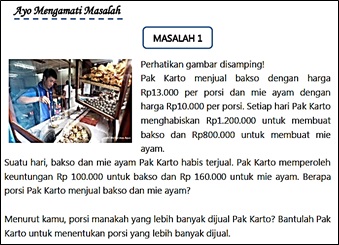
Development of Learning Tools with the Application of Learning Inventions to Improve Mathematical Problem Solving Ability Social Arithmetic Material
Abstract
Keywords
Full Text:
PDFReferences
Akbar, S. (2013). Instrumen Perangkat Pembelajaran. Bandung: Remaja Rosdakarya.
Apriyani, Saragih, S., & Roza, Y. (2018). The Learning Instrument Development of Problem Based Learning Model to Develop The Mathematical Problem Solving Ability on The Curved Sides Space Subject for 9th Grade Students of Junior High School. Jurnal Online Mahasiswa, 5(2), 1-12.
Balım, A. G., (2009). The Effects of Discovery Learning on Students’ Success and Inquiry Learning Skills. Eurasian Journal of Educational Research, 35, 1-20.
Borg, W. R., & Gall, M. D. (1983). Educational Research: An Introduction Fifth Edition. New York, NY: Longman.
Fitria, A. C., Sulistyaningsih, D., & Prihaswati, M. (2014). Keefektifan Metode Guided Discovery Learning Bernuansa Multiple Intellegences untuk Meningkatkan Kemampuan Pemecahan Masalah Matematis. Jurnal Karya Pendidikan Matematika, 1(2), 1-6.
Heleni, S., & Zulkarnain. (2018). The Influence of Mathematical Thinking Ability with Modified MOORE Method on Learning Outcomes of
Basic Mathematic II Chemical Education Students. Journal of Educational Sciences, 2(2), 33-41.
Hutapea, N. M., (2019). Improving Senior High School Students Learning Autonomy through Generative Learning. Journal of Educational Sciences, 3(1), 84-95.
Kemendikbud. (2017). Impelementasi Pengembangan Kecakapan Abad 21 dalam Perencanaan Pelaksanaan Pembelajaran (RPP). Jakarta: Direktorat Jenderal Pendidikan Dasar dan Menengah.
Pal, A., & Poyen, E. F. B., (2017). Problem Solving Approach. International Journal of Advanced Engineering Research and Science, 4(5), 184-189.
Rosdianwinata, E. (2015). Penerapan Metode Discovery untuk Meningkatkan Kemampuan Pemecahan Masalah Matematika Siswa dalam Mendidik. Jurnal Kajian Pendidikan dan Pengajaran, 1(1), 1-8.
Roza, Y., Yuanita, P., Saragih, S., Alfajri, H., & Saputra, A. (2017). Computer-Based Media for Learning Geometry at Mathematics Class of Secondary Schools. Journal of Educational Sciences, 1(1), 79-91.
Sahrudin, A. (2014). Implementasi Strategi Pembelajaran Discovery Learning untuk Meningkatkan Kemampuan Pemecahan Masalah Matematis dan Motivasi Belajar Siswa SMA. Jurnal Pendidikan, 2(1), 1-12.
Setyono, D., & Sutarni, S. (2013). Kesalahan Menyelesaikan Soal Matematika dalam Bentuk Cerita Pokok Bahasan Aritmetika Sosial. Prosiding Seminar Nasional Pendidikan Matematika, 65-74.
Wasilah, I., Murni, A., & Jalinus. (2018). The Development of Mathematics Learning Instruments through Implementation Discovery Learning Model on Subject Circle for Grade XI. Jurnal Online Mahasiswa, 5(1), 1-11.
Yennita, Khasyyatillah, I., Gibran, & Irianti, M. (2018). Development of Worksheet Based on High-Order Thinking Skills to Imporove High-Order Thinking Skills of the Students. Journal of Educational Sciences, 2(1), 37-45.
DOI: http://dx.doi.org/10.31258/jes.4.1.p.44-52
Refbacks
- There are currently no refbacks.
Copyright (c) 2020 Fadriati Ningsih, Atma Murni, Yenita Roza

This work is licensed under a Creative Commons Attribution 4.0 International License.
Publisher: FKIP Universitas Riau












